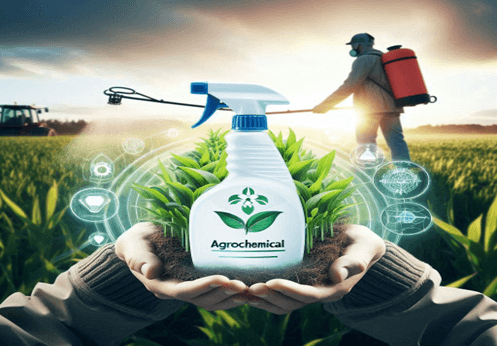The Future of Agrochemicals: Trends and Innovations
Published Date: 12 Oct 2024
For many decades, agrochemicals–often termed pesticides, fertilizers, herbicides, and fungicides have been playing a critical role in the rising production of agriculture. However, with degradation, biodiversity loss, and pollution of water sources due to such widespread application, soils have become increasingly hazardous environments for chemicals. So, there is a need to shift its attention toward developing an alternative that would be less harmful to the environment. New developments in agriculture like precision farming, nanotechnology, and bio-based agrochemicals ensure that the problems mentioned above are dealt with without sacrificing high crop productivity rates. The emerging trends and innovations shaping the future of agrochemicals are discussed here.

The Need for Change
Though classical agrochemicals make up most of the achievements for modern agriculture, they have come to be associated with such problems as soil degradation, water contamination, and biodiversity loss. Considerations like these, in addition to greater regulatory control by governments and increasing consumer demand for sustainably produced food, have pressured agrochemical companies to develop alternative products that are effective and also environmentally friendly.
Trends and innovations:
1. Bio-Based Agrochemicals
The most promising agrochemical innovation relates to the beginning of bio-based solutions. Bio-based agrochemicals are the organic alternative to the synthetic agrochemicals used in agriculture and most of these chemicals used in biopesticides, biofertilizers, and biostimulants are sourced from plants, microorganisms, and natural minerals. Being biodegradable, bio-based agrochemicals tend to be more environmentally friendly variants that would address issues of soil degradation, water pollution, and harm to biodiversity as well as farmers linked with the traditional agrochemicals. With bio-based agrochemicals on the upswing, the market is expected to boom in the years to come as more farmers and companies join the greener initiative.
2. Precision Agriculture
Precision agriculture is revolutionizing the application of agrochemicals. It employs technologies like GPS, drones, IoT (Internet of Things) sensors, and artificial intelligence (AI) in monitoring crops to optimize agrochemical applications and bring farming closer to being efficient and sustainable. IoT sensors and drones can monitor crop health, soil conditions, and pest infections in real time. These data enable making informed decisions on when to apply and where to apply agrochemicals, hence not wasting anything due to incorrect use. Precision agriculture is helping make farming more data-driven and less dependent on excess chemical use and unsustainable practices in general.
3. Nanotechnology in Agrochemicals
Nanotechnology is an emerging field that can potentially make huge revolutions in the agrochemical industry. Agrochemicals can be made more effective by controlling the nanoparticle’s shape, size, solubility, stability, and targeted delivery. Reduced dosages and decreased applications would lead to reduced environmental impact.
a. Nano-pesticides: These pesticides carry the active ingredients in the form of nanoparticles. The slow release of the pesticide enhances the strength of the pesticide and minimizes the number of applications.
b. Nano-fertilizers: Such fertilizers provide nutrients to the crops only at the right time when the crops require them. This reduces the runoff and waste, thereby augmenting the intake of nutrients by the crops.
Nanotechnology in agrochemicals is still at its very beginning stages but promises a lot of efficiency and sustainable agriculture farming processes.
4. Sustainable Packaging and Formulations
In addition to more sustainable chemicals, there has also been a growing trend toward making agrochemical packaging and formulations themselves more sustainable. Many agrochemical companies are moving toward biodegradable packaging materials, which reduces plastic waste.
Further, water-soluble agrochemicals are developed so that they can dissolve in water and thus avoid using extra solvents for application. Such formulation reduced the usage of those hazardous chemicals yet allowed farmers to apply agrochemicals more precisely.
5. Gene Editing and Biotechnology
New gene editing technologies such as CRISPR have provided a new gateway toward more agrochemical applications. Genetically modified crops are made to be more resistant to particular pests and diseases, lowering chemical pesticide inputs. It is also being used to enhance crop varieties with lower fertilizer requirements or those that can grow in adverse environmental conditions.
6. Regulatory Changes and Government Support
In light of the spreading environmental alarm, governments of various countries are tightening regulations on the usage of synthetic agrochemicals. In return, governments also offer economic support and schemes to support sustainable agriculture, for example, through organic farming subsidies and grants related to precision agriculture technologies, which creates a necessity for such innovative agrochemical solutions.
7. Collaboration and Innovation in R&D
The partnership between agrochemical companies, research institutes, and startups is hastening innovation. Most of the big agrochemical companies have already started R&D to get ready with a greener product. Innovation in sustainable agrochemicals is also being driven by the bond between the public and private sectors.
For example, Bayer, Syngenta, and other agrochemical multinationals are heavily investing in developing bio-based pesticides and precision agriculture technologies. Innovative ventures and academic centers are also playing a great role in crafting novel solutions in agrochemicals.
Conclusion
The future of agrochemicals is paved by sustainability, innovation, and efficiency. Contributors to these transformations include bio-based solutions, precision agriculture, nanotechnology, and gene editing in the agrochemical industry. As the pressure of the greening strategy on environmental concerns and the regulatory pressures mounted, agrochemical firms found themselves under immense pressure to get themselves to operate in a more sustainable approach. Better crop yield and increased farming efficiency come with this promise, but also a much more sustainable future for agriculture. Agrochemical technology is going to advance and improve vastly in the next decade to pave the way for more environment-friendly and productive farms around the world.
Maximize your value and knowledge with our 5 Reports-in-1 Bundle - over 40% off!
Our analysts are ready to help you immediately.
